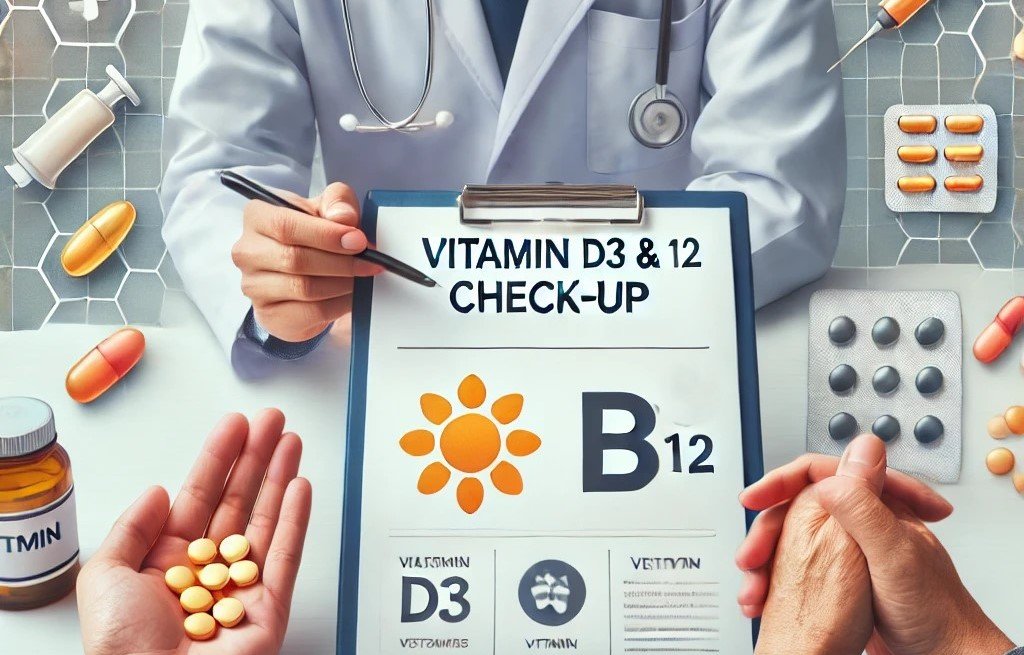
Are You Ignoring These Silent Deficiencies?
You might feel tired, experience frequent headaches, or struggle with low immunity, yet blame it on a busy lifestyle. But what if the real reason is something as simple as a Vitamin D3 or B12 deficiency?
These essential vitamins play a crucial role in your overall well-being, and their deficiency often goes unnoticed until it starts affecting your daily life. Regular check-ups can help detect imbalances early, preventing long-term health issues.
Why Vitamin D3 and B12 Are Essential
Vitamin D3: The Sunshine Vitamin
Vitamin D3 helps the body absorb calcium, ensuring strong bones and teeth. It also plays a role in immune function, muscle strength, and mood regulation. A deficiency can lead to:
- Weakened bones (osteoporosis or rickets in children)
- Increased risk of fractures
- Muscle weakness
- Fatigue and low energy levels
- Depression and mood disorders
Vitamin B12: The Energy Booster
Vitamin B12 is crucial for nerve function, red blood cell formation, and DNA synthesis. A deficiency can lead to:
- Fatigue and weakness
- Memory loss and cognitive issues
- Nerve damage (tingling or numbness in hands and feet)
- Mood swings and depression
- Anemia and pale skin
When Should You Get a Vitamin D3 and B12 Test?
While anyone can develop a deficiency, certain groups are more at risk. Consider getting tested if you:
- Experience persistent fatigue or weakness – Chronic tiredness may indicate low levels of Vitamin B12 or D3.
- Have frequent bone or muscle pain – Aching bones and muscles could be a sign of Vitamin D3 deficiency.
- Suffer from mood disorders – Depression, irritability, and anxiety can be linked to low levels of both vitamins.
- Follow a vegetarian or vegan diet – Vitamin B12 is primarily found in animal-based foods, making vegetarians and vegans more susceptible to deficiency.
- Have digestive issues – Conditions like IBS, Crohn’s disease, or celiac disease can impair the absorption of essential vitamins.
- Are over 50 years old – As we age, the body’s ability to absorb Vitamin B12 decreases, making supplementation and regular testing essential.
- Spend limited time in sunlight – People who stay indoors most of the time or use excessive sunscreen may not get enough Vitamin D3 naturally.
- Have undergone weight-loss surgery – Some surgical procedures can affect vitamin absorption, increasing the risk of deficiencies.
How Often Should You Get Tested?
- At least once a year if you have a history of deficiency or are at high risk.
- Every 6 months if you are undergoing treatment for a deficiency.
- As per your doctor’s recommendation if you experience symptoms related to vitamin deficiencies.
How to Prevent Vitamin D3 and B12 Deficiencies
For Vitamin D3:
- Get 15-30 minutes of sunlight exposure daily, especially in the morning.
- Consume Vitamin D-rich foods like fatty fish, egg yolks, and fortified dairy products.
- Take Vitamin D supplements if prescribed by a doctor.
For Vitamin B12:
- Include B12-rich foods such as meat, dairy, eggs, and fortified cereals.
- Consider B12 supplements if you follow a vegetarian or vegan diet.
- Get B12 injections if you have severe deficiency or absorption issues.
Book Your Vitamin D3 and B12 Test with My MD Dr.
Early detection of deficiencies can prevent long-term health complications. At My MD Dr, they offer quick and convenient lab tests at your doorstep to check your Vitamin D3 and B12 levels. With NABL-accredited labs and expert medical consultation, managing your health has never been easier.
